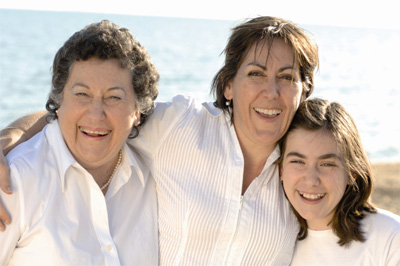Perimenopause: are we there yet?

Perimenopause: are we there yet?
Did you know that the medical definition of menopause is simply when it's been 12 months since your last menstrual period? After that point, a woman is classified as postmenopause. The time leading up to menopause is called perimenopause, when many 40-something women experience fluctuations in their menstrual cycle, PMS-like symptoms (sore breasts, bloating, headaches, mood swings), tiredness, forgetfulness, hot flushes and weight gain.
Perimenopause can last anywhere from one to ten years, with the average time being four to six years. During this time, your ovaries start to run low on eggs and your hormone levels become erratic, causing the symptoms. Unfortunately, there is no way to predict how long perimenopause will last - it varies between women and just because your Mum or sister had it easy or tough, it doesn't necessarily mean that you will be the same.
So what can you do? The first step is to examine your lifestyle; make sure you are eating a healthy balanced diet and getting enough physical activity. Now is the perfect time to take stock of your health and make small changes where necessary. You should also make sure you always use contraception until 12 months after your last period to avoid unwanted pregnancy.
If your symptoms are severe or if they are interfering with your quality of life, seek help from your health professional. Possible therapies include the combined oral contraceptive pill, hormone replacement therapy, the Mirena intrauterine device (IUD) (to treat heavy bleeding) or natural therapies prescribed by a trained naturopath.
The Jean Hailes Foundation for Women's Health is hosting a webcast later this year on 'Making your 40s fabulous: your hormones, your libido, your health'. This one hour online seminar will cover health issues that may affect women in their 40s, such as hormonal changes, libido, physical changes, sleep, stress, emotional health and maintaining health for the future.
If you would like to know more about the upcoming webcast, go here:
www.jeanhailes.org.au
Published with the permission of the Jean Hailes Foundation for Women's Health
Tollfree number 1800 151 441 for women seeking further health information www.jeanhailes.org.au
MORE
- Menstrual Period Management
- The Secret to Weight Loss
- Feeling The Pain: How To Tackle Period Pain
- Period Pain and How to Survive It
- Gender Specific Medicine
- Helping Women To Start Those 'Difficult'...
- Michelle Boyd Ellura Interview
- Menopause Does Not Protect Women From Cervical...
- Five Ways to Balance Hormones
- Do You Really Know What Is Going On Down There?
- Do You Know Your Breasts?
- Dr. Stan Goldstein Sexual Health Choices Interview
- Breast Health Decision Question and Answers
- Breast Cancer Treatment Impacts Patients' Sex...
- Bladder Weakness More Common Than Hay Fever
- Belinda Reynolds How To Manage UTI's Naturally...
- Treat Bones Like Breasts
- Mammogram Technology
- Soodox for Women
- Chlamydia Most Commonly Reported STI In Australia
- Time For Reflection Is Great For Mental Health



